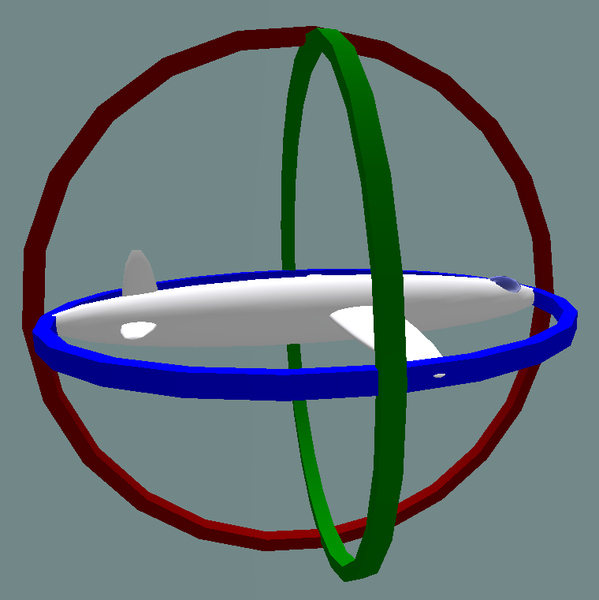1/26/2013
I was first introduced to the connection between linear algebra and gyroscopes in Robot Kinematics and Dynamics class, when
Dave the TA mentioned gimbal lock. A gimbal is a mechanical device that functions as a gyroscope, with each axis describing an Euler angle. The problem with Euler angles is singular representations, as seen below, where a degree of freedom can be lost. A linear algebra interpretation is two Euler angle mappings to one orientation, meaning there is no unique inverse (and thus a singularity).

------->

This phenomenon is really dangerous in planes because the pilot can lose information about his orientation, like in
Apollo 11 where the spaceship did not have any prevention measures in place for gimbal lock. Fortunately, the brilliant astronauts-turned-astronomers were able to re-calibrate their gimbals using the stars as reference.
Gimbal lock can be resolved using two gimbals offset in both position and orientation, in which the number of gimbal lock cases should be reduced dramatically, or by adding a fourth dimension to the gimbal.
---
Recently, I've begun to notice the ubiquity of gyroscopes in nature. In
Metin's bio-inspired robotics, I learned about mosquito
halteres, and two days ago we talked about the
vestibular system in
Richard's psychology of music class.
A haltere is an organ in mosquitoes that functions as a gyroscope, shown below:
I don't know how accurate this entomological sketch is, but I would imagine that the offset in the halteres is more than just a coincidence - it's probably to prevent gimbal lock! I would suspect that there's also an offset in the haltere orientation, as well as an offset in position in the axis going into this blog.
Humans also have built-in gyroscopes - the anterior canal, posterior canal, and horizontal canal:
You can kind of see it in the picture - the canals seem to form an orthogonal basis.
I bet that the sets of canals are slightly offset in angle/position in both ears to avoid gimbal lock, just like in planes and mosquitoes, and that balancing issues in people stem from problems with the orientation and position of their three canals! So, I hypothesize that there may exist a surgery that could repair equilibrioception in people.
---
This observation really sheds light for me on the value of interdisciplinary information use.
Pictures from wikipedia.

 ------->
-------> 

